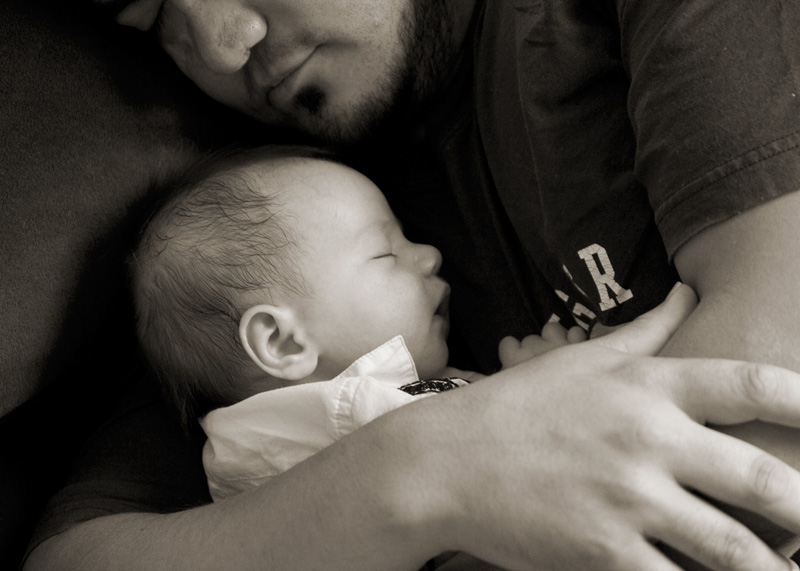This post is also available in Dutch.
It feels intuitive to hug and cuddle babies. But do you know why this physical contact is so important? One reason is that touch actually programs the way our bodies respond to stress.

Through hugs, this dad is helping his baby grow up to have healthy stress-regulation. Photo by Karen Sheets de Gracia (CC BY 2.0)
You may have heard about the neglectful conditions of Romanian orphanages discovered in 1989. These babies weren’t hugged or cuddled. Instead, caretakers gave them minimal attention and sometimes administered drugs to calm them down. These conditions had devastating effects; at preschool age, the orphans had a 30% increased risk of developing psychiatric disorders like anxiety and depression. Although these orphans were deprived of many types of stimulation, researchers have suggested that the deprivation of physical contact may have been one of the primary causes of their developmental issues. Studies have demonstrated that touch is vital for the proper development of the stress response system.
The importance of maternal care
Most of what we know about the importance of touch comes from rat studies. Surprising, right? Rats show natural differences in how often they lick, groom, and nurse (LGN) their pups. Rat pups raised by low LGN mothers show deficits in learning and memory, and adapt poorly to stressful situations, displaying more fear when exploring an unfamiliar environment.
Researchers have also examined the consequences of replacing maternal touch with artificial touch. When rat pups are separated from their moms for a full day, their stress response system is activated. But this activation can be dampened if they are stroked by researchers during the separation period.
What’s happening in the brain?
Early-life touch regulates the development of our brain’s stress response system, which centers around a region called the hypothalamus. The hypothalamus signals glands to produce stress hormones, the most notable of which is cortisol. In the short-term, high cortisol levels can have many positive effects, like increased attention, learning, and memory. However in the long-term, high cortisol levels can cause issues like decreased attention, insomnia, and depression. Therefore, your body also has a system for shutting off cortisol production after the stressful situation has passed. A region of the brain called the hippocampus contains sensors called cortisol receptors which respond to the presence of cortisol. When these receptors are activated, the hippocampus sends signals that prompt the hypothalamus to stop the production of stress hormones.
This system is affected by physical touch in early life. In rats, maternal touch actually increases the production of these cortisol receptors through genetic changes; rats who were raised by high LGN mothers have more cortisol receptors in the hippocampus. As a result, their stress response system is able to turn off cortisol production by the hypothalamus much more efficiently. So these rats display decreased levels of stress hormones in response to stressful situations.
Essentially, physical contact “programs” how the baby’s stress-response system will respond to stress in the future. Of course, children need more than just touch to grow into happy, healthy adults. But hopefully understanding this mechanism can prevent disastrous institutional environments like the Romanian orphanages, as well as help families raise healthier children.
More Information:
Free parenting guide based in neuroscience and endorsed by Nobel Peace Prize Laureates Desmond Tutu and Betty Williams (and written by my mother!)
Simple resource on epigenetics, stress, and maternal care
This blog was written by Juliette
Edited by Roselyne
